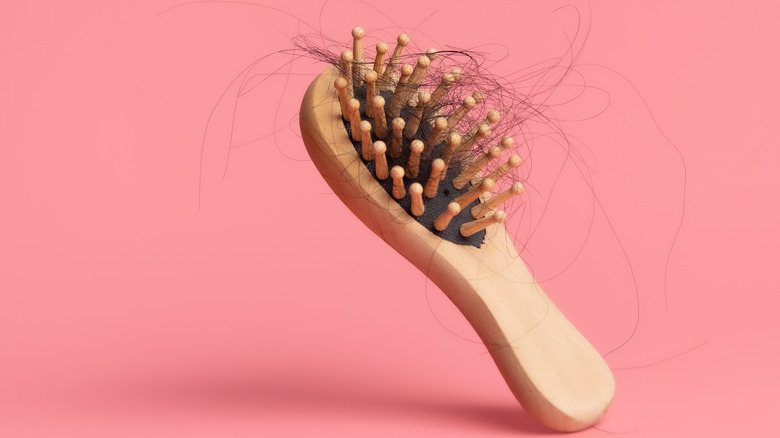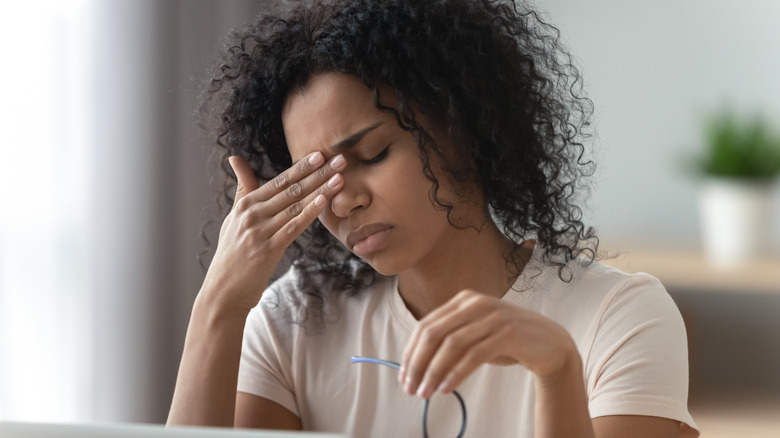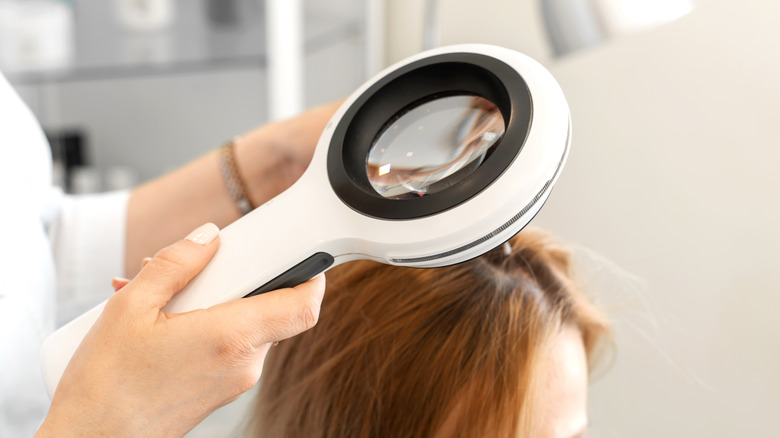Is Menopause Responsible For Your Hair Loss?
While many believe hair loss is predominantly an issue men face, that's a myth that needs to be retired. While everyone notices some stray strands in their hairbrush or even some shedding in the shower, both of which are normal, there's a big difference between that and what is medically considered to be significant hair loss.
In general, people usually lose anywhere between 50 to 100 hairs each day, a process considered typical shedding, according to the American Academy of Dermatology. After you lose those strands, others grow in to maintain your usual fullness. But sometimes you lose more hair than average and it does not self-replenish. This is where typical hair shedding becomes hair loss, and The Cleveland Clinic reports that over 50% of women will come face to face with this challenge at some point.
Women's hair loss can be caused by several things, from pregnancy and regular bleaching or dyeing of hair to reactions to medications such as chemotherapy. In the search for answers, women often look for the best ways to fight stress-induced hair loss, but age should also be a consideration. Women over 40 are more prone to hair loss, especially those navigating the ups and downs of menopause.
Let's chat about menopause
Menopause is the phase of a woman's life generally noted as beginning 12 months after her last period. The period leading up to menopause is a stretch known as perimenopause, which is typically four years in duration but can easily last more than a decade, per WebMD. Over these many years, there are significant hormonal changes, and most women will have to contend with hot flashes, sleeplessness, irregular periods, and a laundry list of issues that can seriously impact their quality of life.
"The changes, the highs and lows, and the hormonal shifts, there is power in that," Michelle Obama said of her menopause experience in an episode of her podcast titled "What Your Mother Never Told You About Health with Dr. Sharon Malone" (via Harper's Bazaar). She went on to say that "we were taught to be ashamed of it and to not even seek to understand it or explore it for our own edification, let alone to help the next generation." The less discussion there is about what happens to women's bodies during this stage of life, the more ignorance will remain about possible symptoms that come along with it.
While this topic is being discussed more openly in recent years in publications such as The Guardian and The New York Times, many women still don't know that hair loss can be just one of the symptoms associated with menopause.
The connection between hormones and hair loss
If you notice hair loss but haven't experienced any major health changes — pregnancy, restrictive diets, stress, or beginning a new medication, for example — you may want to chat with your primary care physician or gynecologist. In an interview with PureWow, Florida-based expert Dr. Staci Tanouye suggests that although "Menopause-related hair loss is not necessarily permanent and, like other symptoms, will often stabilize over time," it's still important to rule out other causes before working on a solution.
Tanouye works as a board-certified gynecologist, and her advice is to evaluate your scalp not just for hair loss but also for changes in texture and fullness. "Aging in general leads to slower hair growth and reduction in hair cycling," she notes. This is because "hormone levels decline during menopause, [and] it causes a decrease in the growth phase of the hair cycle, decreased density of hair as well as increased thinning and dryness."
In addition, Cleveland Clinic says signs of hair loss in women may include brittle tresses, readily visible scalp, thinner ponytails, and areas that look sparse. In an otherwise healthy woman, these might indicate menopausal hair loss, which Tanouye admits is generally unpreventable. But don't despair! The good news is that it's often mild. She goes on to assure folks that eating nutrient-dense foods, avoiding stress, and increasing circulation with good ol' fashioned exercise can all help. And if you need additional hair loss treatments, over-the-counter Rograine and volumizing products can work wonders.


